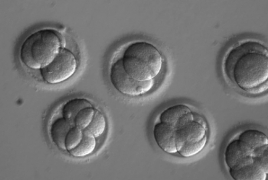Scientists edit human embryo to erase heritable heart condition August 3, 2017 - 16:50 AMT PanARMENIAN.Net - Scientists have successfully edited the DNA of human embryos to erase a heritable heart condition that is known for causing sudden death in young competitive athletes, cracking open the doors to a controversial new era in medicine, The Washington Post reports. This is the first time gene editing on human embryos has been conducted in the United States. Researchers said in interviews this week that they consider their work very basic. The embryos were allowed to grow for only a few days, and there was never any intention to implant them to create a pregnancy. But they also acknowledged that they will continue to move forward with the science, with the ultimate goal of being able to “correct” disease-causing genes in embryos that will develop into babies. News of the remarkable experiment began to circulate last week, but details became public Wednesday, August 2 with a paper in the journal Nature. The experiment is the latest example of how the laboratory tool known as CRISPR (or Clustered Regularly Interspaced Short Palindromic Repeats), a type of “molecular scissors,” is pushing the boundaries of our ability to manipulate life, and it has been received with both excitement and horror. The most recent work is particularly sensitive because it involves changes to the germ line – that is, genes that could be passed on to future generations. The United States forbids the use of federal funds for embryo research, and the Food and Drug Administration is prohibited from considering any clinical trials involving genetic modifications that can be inherited. A report from the National Academies of Sciences, Engineering and Medicine in February urged caution in applying CRISPR to human germ-line editing but laid out conditions by which research should continue. The new study abides by those recommendations. The research involved eggs from 12 healthy female donors and sperm from a male volunteer who carries the MYBPC3 gene, which causes hypertrophic cardiomyopathy. HCM is a disease of that causes an abnormal thickening of the heart muscle but can cause no symptoms and remain undetected until it causes sudden cardiac death. There’s no way to prevent or cure it, and it affects 1 in 500 people worldwide. Around the time the sperm was injected into the eggs, researchers snipped out the gene that causes the disease. The result was far more successful than the researchers expected: As the embryo’s cells began to divide and multiply, a huge number appeared to be repairing themselves by using the normal, non-mutated copy of the gene from the women’s genetic material. In all, they saw that about 72 percent were corrected, a very high number. Researchers also noticed that there didn’t seem to be any “off-target” changes in the DNA, which has been a major safety concern of gene-editing research. Photo. Oregon Health & Science University via AP Authorities said a total of 192 Azerbaijani troops were killed and 511 were wounded during Azerbaijan’s offensive. In 2023, the Azerbaijani government will increase the country’s defense budget by more than 1.1 billion manats ($650 million). The bill, published on Monday, is designed to "eliminate the shortcomings of an unreasonably broad interpretation of the key concept of "compatriot". The earthquake caused a temporary blackout, damaged many buildings and closed a number of rural roads. Partner news |